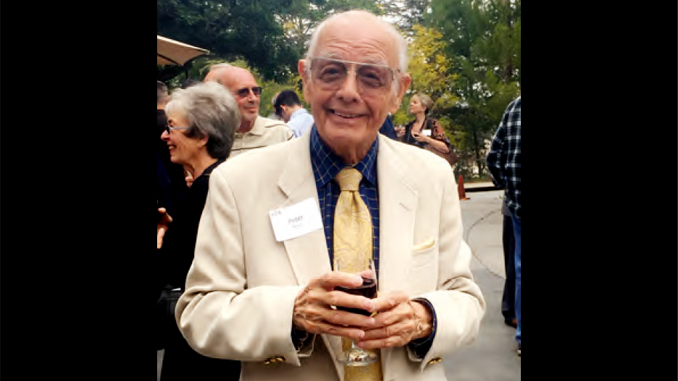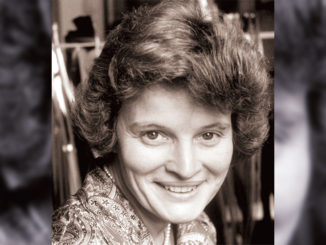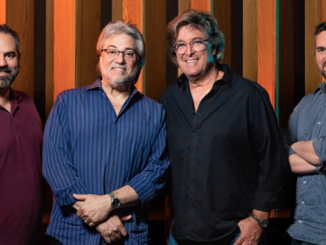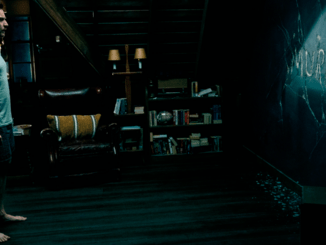
AUGUST 15, 1922 — JANUARY 2, 2024
A renaissance man. A gentleman. A portrait in dignity. This is how Academy Award-winning sound effects editor Peter Berkos — who passed away at the age of 101 on Jan. 2 — will be remembered by his colleagues and loved ones.
“He loved his craft. He loved his industry,” said Toni Kraft, a close friend of Berkos’ for more than 20 years. “But he also loved his family — both past and present.”
She said Berkos wasn’t your typical 101-year-old, adding that “he was constantly reinventing himself to be relevant, to be valued, and to do things that kept him vibrant.”
Born in 1922 in Cicero, Ill., Berkos and his twin brother, Paul, served in the U.S. Army Air Corps in World War II. After the war, he earned his Bachelor of Arts degree from Columbia College in Chicago, then worked in radio and directed local theater productions before moving West and snagging a job in the storeroom at Universal Studios in 1951.
Berkos soon moved into sound effects, working out of Building 50 and working his way up from apprentice to supervising editor, cementing a nearly 40-year career at the studio that continued until his retirement in 1987. He worked on nearly 300 feature films (including “The Sting” and “Thoroughly Modern Millie”) and 1,000 episodes of television during his illustrious career, earning the “Special Achievement in Sound Editing” Academy Award in 1976 for “The Hindenburg,” among other accolades (including seven Golden Reel awards for “Battlestar Galactica,” among other shows, and an Emmy nomination for his supervising work on “Short Walk to Daylight”).
He made many contacts during his time at Universal, including a 13 year-old boy who after school was helping his parents who worked on the lot. That boy was Bill Elias, later a picture editor and still a longtime member of the MPEG board of directors.
“Anyone starting out in sound effects at Universal, he mentored,” Elias said. “He knew my Mom and Dad really well and was like a family member in a lot of ways.” Berkos’ mentorships included a month-long sound effects tutorial with a 19-year-old Steven Spielberg, whom Berkos later called “the most eager learner” he’d ever met.
Another one of those young mentees was sound effects editor Glenn Hoskinson, who recalled how “classy” Berkos was in both his professional dress and his work ethic. But it wasn’t always all work for the dedicated editor and mentor.
“Peter liked to say, ‘My brother was serving overseas, saving people’s lives and getting the Silver Star [Medal], and I was at the Stage Door Canteen, dancing with Joan Crawford,’” Elias remembered.
It was a simpler time, Berkos told his friend Kraft of his early days in Hollywood. “The actors — Natalie Wood and Robert Wagner — would go to work like everyone else,” he explained. “We all were just like everyone else. We waited for our paychecks. Everybody loved what they got to do. And there was an integrity and work ethic to the job. We knew we needed to finish on time.”
That integrity informed everything Berkos did, from his work on television and film to his advocacy for sound effects editors during his two terms as president of the Motion Picture Sound Editors (MPSE) from 1963 to 1966. He worked tirelessly for more than two decades to achieve full membership for sound editors in both the Motion Picture and Television Academies and to obtain full screen credit recognition for sound editors — a legacy that lasts to this day. He was awarded MPSE’s Lifetime Achievement Award in 1996.
After retiring from Universal in 1987, he began a second act teaching seminars at the University of Southern California for 16 years, and later, a third act as an author. He wrote and published multiple books, including “Tpito the Third Twin,” “Stage Fright,” “The Double Double Cross,” and a two-part memoir, “Vignettes of My Life.” He also compiled and self-published “Reflections and Memoirs of Sally Ann Berkos,” a collection of his late wife’s writings.
Ever the director, he led a writers group for 20 years in Rancho Bernardo, which is where he first met and mentored Kraft with her own writing. Berkos was devastated by Sally Ann’s death in 2000, Kraft said. “I can’t tell you how many hours of their adventures I heard about,” she added. “He loved his wife. He loved his children, grandchildren, and great-grandchildren.”
Elias remembered how positive his dear friend always was. Indeed, of his achievements in sound editing, Berkos told CineMontage in 2004: “I’ve had a wonderful career. I made friendships that have lasted a lifetime and worked with the greatest people in the business.”
He is survived by his son, Peter, his daughter, Linda, nieces, grandchildren, great-grandchildren, and numerous friends. He was preceded in death by his wife, Sally Ann Berkos, his son Terence Berkos, and his identical twin brother, Paul Berkos.
He will receive f ull militar y funeral honors at services in San Diego, Calif., in March.
– Kristin Marguerite Doidge





